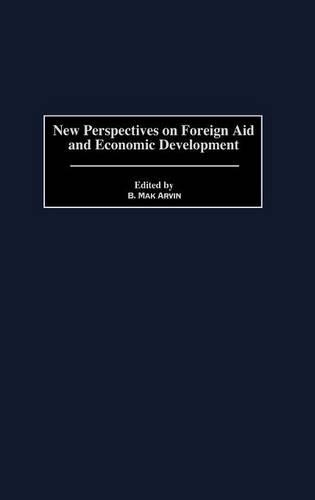
New Perspectives on Foreign Aid and Economic Development
(Hardback)
Publishing Details
New Perspectives on Foreign Aid and Economic Development
By (Author) B. Mak Arvin
Bloomsbury Publishing PLC
Praeger Publishers Inc
30th May 2002
United States
Classifications
Tertiary Education
Non Fiction
Aid and relief programmes
Development studies
338.91
Physical Properties
Hardback
312
Width 156mm, Height 235mm
595g
Description
Evaluates emerging questions about the allocation and efficiency of aid, reasoning that the success and failure of aid programs is shared jointly by donors and recipients. The success or failure of economic assistance programs is a shared responsibility of recipient countries and donors. The negative attitude about aid prevalent today underscores a perception the aid has failed. Critics often blame corrupt regimes, weak governments, or poor economic policies. However, the poor track record of aid is also due to donors' inability to allocate limited funds effectively and poor coordination of their aid efforts. Declining aid budgets have led to fundamental questioning of foreign aid's allocation and utility, while the apparent ineffectiveness of aid has shrunk aid budgets and turned public opinion against providing it. This edited collection containing pieces written by leading development specialists evaluates these emerging questions of allocation and efficiency. Development economists, policy makers, and development specialists will benefit from reading this work. Chapters examine the optimal and intertemporal allocation of aid, the role and accountability of NGOs in allocation, the importance of untying - a new perspective on low levels of aid, and links between the allocation pattern of donors. Additional chapters deal with the impact of aid on economic growth, democracy, wage inequality between skilled and unskilled labor, and the role of governance and institutional capacity in aid effectiveness. An effective balance between theoretical and empirical models are offered to better illustrate the issues involved.
Reviews
"This brilliantly edited volume presents a splendid and informative discussion on the needed and timely topic of Foreign Assistance, focusing on allocation and efficiency of Aid. Its comprehensive and balanced approach make it an excellent reference text for not only the graduate students and researchers in the field of development economies, but also to the politicians and the policy makers. [It] Should be on the shelf of every library." Ismail Shariff, Hendrickson Professor of Business, University of Wisconsin, Green Bay
Author Bio
B. MAK ARVIN is Professor of Economics at Trent University, Peterborough, Ontario.
